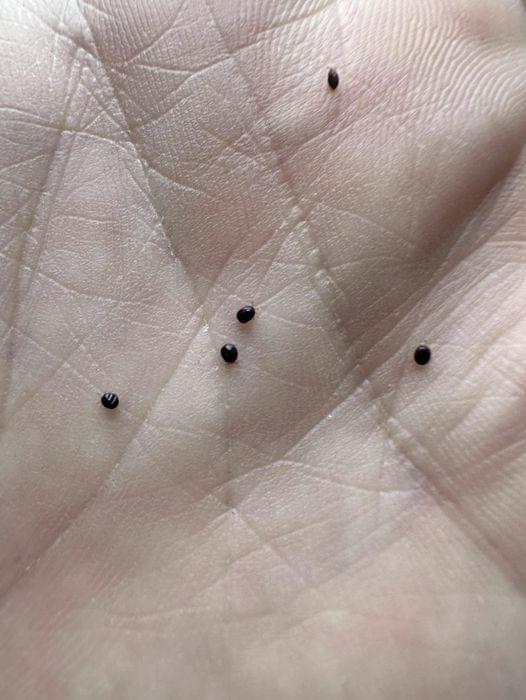What do I hate more than ticks? Let me think… Ah, yes, last summer was a tick-infested nightmare. My dog turned into a tick magnet, and I found myself regularly hunched over with a pair of tweezers, carefully plucking these blood-sucking pests from his fur. Thank goodness I wasn’t alone in this tickpocalypse—my friend was there for moral support, albeit from a very safe distance. But that tells you everything you need to know about ticks, right? Disgusting, scary, and something we all want to avoid. Just the thought of them makes my skin crawl. So, you can imagine my horror when I first encountered tick eggs.

For those fortunate enough to be unfamiliar with ticks, they are small, parasitic creatures that feed on blood and are not only a nuisance but can also spread serious diseases to both pets and humans. Think of them as the unwanted guests at a party, except these intruders bring along the risk of Lyme disease, Rocky Mountain spotted fever, and a host of other illnesses you definitely want to avoid.
What to Do When You Find a Tick
First things first, if you ever find a tick on your body, the number one rule is: don’t panic. The key is to remove it as quickly and safely as possible. Here’s how to do it:
- Grab Fine-Tipped Tweezers: Use fine-tipped tweezers to grasp the tick as close to the skin’s surface as possible.
- Pull Steadily: Pull upward with steady, even pressure. The goal is to remove the tick whole, without leaving parts embedded in the skin.
- Clean the Area: After removing the tick, wash the bite area and your hands with alcohol, iodine cleaner, or soap and water.
- Dispose of the Tick Safely: Don’t crush the tick with your fingers. Instead, place it in alcohol, seal it in a bag or container, wrap it in tape, or flush it down the toilet.
Remember, it’s always recommended to consult a doctor after finding a tick on your body, especially if you’re unsure about how to remove it properly. A healthcare professional can ensure the tick is fully removed and advise you on any necessary follow-up care.
The Nightmare Begins: Discovering Tick Eggs
Let’s rewind to where this horror story began—tick eggs. These tiny, reddish-brown clusters are often laid in hidden spots like your garden. They may look small, but don’t be fooled; each of those tiny eggs has the potential to become a tick, which could eventually end up on you or your pets.
The real danger lies in the numbers. A single female tick can lay thousands of eggs at a time, which means a few overlooked eggs can quickly turn into a full-blown infestation. And with ticks come the risks of disease transmission, not to mention the sheer discomfort of knowing they’re lurking in your backyard.
How to Identify and Remove Tick Eggs

Tick eggs are small, but they’re not invisible. They’re often laid in clusters and can resemble a slightly grotesque pearl necklace. If you stumble upon these in your garden, don’t panic—take action. Here’s how to deal with them:
- Gear Up: When I discovered tick eggs in my garden, I approached the task like a soldier going into battle. Wearing gloves is a must to protect your hands.
- Carefully Collect the Eggs: Gently scoop the eggs into a jar filled with rubbing alcohol. This method kills them instantly and prevents any chance of them hatching.
- Check the Area: After removing the eggs, thoroughly inspect the surrounding area for any additional clusters or ticks. You don’t want to leave any behind.
- Clean and Treat the Area: Once the eggs are removed, clean the area thoroughly. I used a mixture of water and permethrin, a pesticide effective against ticks. However, be sure to use any chemical treatments according to the product’s instructions and with caution, especially around pets and children.
Preventing Tick Infestations: Tips for a Tick-Free Yard
Preventive measures are your best defense against ticks and their eggs. Here are some strategies to help keep these uninvited guests out of your yard:
- Maintain Your Lawn: Keep your lawn mowed and bushes trimmed. Ticks thrive in tall grass and overgrown shrubs, so regular maintenance is key.
- Create a Barrier: Use wood chips or gravel to create a barrier between your lawn and wooded areas. This can help restrict tick migration into your recreational spaces.
- Use Tick Repellents: When venturing into wooded or grassy areas, apply tick repellents to your clothing and gear. This can help keep ticks at bay when you’re outdoors.
- Treat Pets with Tick Prevention Products: Consult your veterinarian about the best tick prevention products for your pets. Regular treatment is essential to keep them safe.
- Regular Checks: After spending time outdoors, thoroughly check yourself, your family, and your pets for ticks. Early detection is crucial for preventing bites and the spread of disease.
The Reality of Tick Eggs: Should You Be Worried?

Finding tick eggs in your garden can be unsettling, but it’s not the end of the world. According to Animal Planet expert Dave Salmoni, while the sight of tick eggs might be enough to give anyone the creeps, the likelihood of them leading to a massive infestation is relatively low. However, it’s still important to deal with them promptly to avoid any potential problems.
Salmoni notes that while it’s behaviorally plausible for snakes to seek shelter in pool noodles, finding tick eggs in your yard is more common in areas with dense foliage and high tick populations. The key takeaway is to remain vigilant, but don’t lose sleep over the possibility. With proper prevention and prompt action, you can keep your yard tick-free and enjoy the outdoors without worry.
Conclusion: Staying Vigilant in the Battle Against Ticks
Ticks are a part of life, especially for those of us who enjoy spending time outdoors. But that doesn’t mean we have to let them ruin our fun. By staying vigilant, taking preventive measures, and acting quickly when you spot tick eggs or the ticks themselves, you can protect your home and loved ones from these pesky parasites.
Here’s to a tick-free future—or at the very least, being well-prepared to deal with them when they show up! With the right approach, you can keep your outdoor spaces safe, comfortable, and enjoyable all season long.


